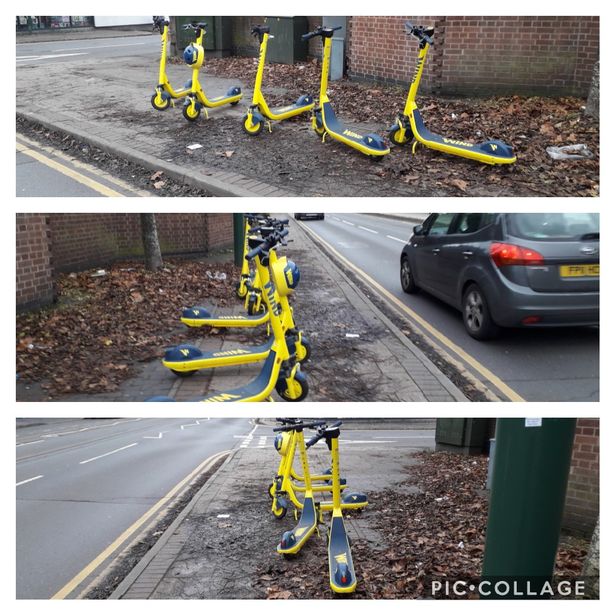We looked a while back at the potential new transport option on university campuses offered by e-scooters. Whilst some were excited, the US experience was very mixed. They are easy and fun to use (it says here) and relatively cheap and economical. So you can see the attraction as a means of addressing public transport concerns in the time of Covid-19 but also as part of a green transport programme.
However, the early implementers of the approach in the US have found that the vision of easy, cheap and flexible transport on campuses as not been wholly delivered. In fact the general approach was for students simply to abandon the scooters at the end of their ride, causing significant obstructions to other traffic. In addition, US universities sometimes had to impound large numbers of scooters – the University of Texas at Austin impounded about 700 before creating a set of scooter guidelines and designated parking areas.

Accidents will happen
However, they really do look like fun to students in particular, hence the focus on universities. But there are real safety fears – and this Chronicle news item notes a recent study on US scooter collisions which reports that:
249 people were admitted to two urban emergency rooms over the course of the year in connection to scooter collisions. About 92 percent were riders, but the rest weren’t. About 30 percent had fractures. And 40 percent suffered head injuries. Tarak K. Trivedi, the study’s lead author and a research fellow at the University of California at Los Angeles, also wrote that few people were taking any safety precautions when riding the machines.
“Riders share roads with fast-moving vehicular traffic but appear to underestimate hazards,” the report reads. “We found that 94.3 percent of observed riders in our community were not wearing a helmet.”
Celebrities are not immune from e-scooter accidents either as this recent report of Rihanna chewing the pavement in LA notes.
And there are some doom-laden takes in the Express from one lawyer who predicts bankruptcy for anyone involved in an accident who did not have the foresight to take out fully comprehensive scooter insurance.
Coming to a city near you
Despite all this, the great news is they are now being introduced on a wider scale in the UK but the early trials have demonstrated that people are rather reckless while riding them apparently:
Escooter trials have been operating around England over the past few months, and general sentiments are that they aren’t going all that well. As seems to always be the case when escooter trials begin, people misuse them, they get parked in places they shouldn’t be, and they become the focus of conversation because of rule-breaking riders.
All that said, the Transport Committee believes the country is ready for them, whether privately owned or on ride-share schemes.
Meanwhile one of the trials back in September saw e-scooters available to use in Coventry city centre was halted less than a week after it began. The City Council pulled the plug saying concerns had been raised that scooters were being used on pavements and in pedestrianised areas:
A spokesman for Coventry City Council said: “The trial has been introduced to identify the safest way that e-scooters can be used going forward so it’s right to pause the scheme if concerns are being raised.
“The initial take-up has been encouraging but we need to ensure that the safety of all people using the city centre is protected and that the e-scooters are used in the proper way, hence our decision to pause the pilot until systems are improved.”
Scooters for students
So, despite the concerns there are many more e-scooter schemes now up and running across the country, including in university centres such as Kent, York, Salford, Northampton and here in Nottingham.

They haven’t been universally popular with Nottingham locals though as the local paper reports, noting the concerns over badly parked or abandoned scooters. The Post quotes Eric Wang, CEO and co-founder of Wind Mobility, the local e-scooter provider:
“Safety, Stability and Sustainability are the three Ss that guide Wind’s considerate and inclusive approach to working with cities.
“We want our service to benefit all members of the community, and help make cities even greater places to live, work and visit.
“Our dedicated local teams work around the clock to swiftly move in and reposition any wrongly parked scooters and will engage with the community to respond to its questions and concerns.”
(I think he might be getting mixed up with the other three Ss: “See it, Say it, Sorted)
In addition there have been issues on campus in Nottingham. For example, there was this recent security report:
01:55 Report of three persons riding electric scooters on Beeston Lane. The group were shouting at passers-by and producing electronic noises. Security to follow up.
The view seems to be that there are benefits from this mode of transport – not only do they seem exciting, efficient and fun but they address the public transport concerns of the pandemic. However, as these and every other stories about scooters confirm, not everyone can be trusted to use them responsibly. Ideally, where the rules are broken there would be rigorous enforcement but that does seem more than a little optimistic. Especially on university campuses. But it does seem that e-scooters are here to stay. Have you had any exciting scooter experiences on your campus?














“Have you had any exciting scooter experiences on your campus?” Considering how few people there are on campus too many, local children have adopted them, often stolen from the children of well off Academics stupid enough to buy them for their children, for fast escapes when smashing University windows, and younger adults using them for bag snatching with the silent approach and easy escape down paths even their previous favourite the twist and go scooter (usually miss called a moped) won’t fit. Then there’s the clever b’stard s-TOO-DENSE who modify them to achieve crazily high speeds, one was timed and… Read more »